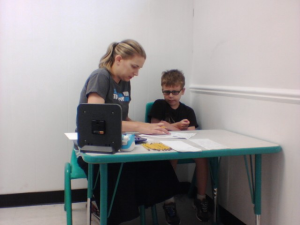Sometimes you just have to pause and reflect on how far you’ve come. In the thick of a chronic condition like autism where you are working with today’s reality while stretching toward tomorrow’s possibility, you need to make sure you’re increasing in strength. While setbacks, emotional days and disappointments surely will come, the question becomes, “Yes, but at the end of the day, am I still moving forward?”
It’s an awkward place, living in the “inbetween.” I am neither at the start like we were when we first got Josiah’s diagnosis over 3 years ago, nor am I near the desired destination (I don’t have a clue what mile marker we’re even at right now, quite honestly). Life is being lived in the “inbetween.” It’s one of the most rugged places in life. But it’s the richest spiritual journey I have ever been on.
The word “journey” doesn’t really seem to suffice, though. But “pilgrimage” does. I’ve gained great comfort and fuel from Psalm 84 that describes a pilgrimage.
What joy for those whose strength comes from the Lord,
who have set their minds on a pilgrimage to Jerusalem. (Ps. 84:5)
To put that into context, one author says, “A pilgrimage is holy journey with a purpose in every step. The pilgrim knows that life-giving challenges will emerge. New and old places in the heart are visited. Blessings are received and healing takes place. After the pilgrimage life is seen with different eyes and it will never be the same again.” That’s exactly what I’ve been experiencing.
In one translation, instead of saying that their minds are on a pilgrimage to Jerusalem, it says, “their hearts are on the road that leads to You.”
When they pass through the Valley of Weeping (Baca), they make it a place of refreshing springs. The autumn rains will clothe it with blessings. (Ps. 84:6)
So, I found myself in a valley of autism. And I was weeping. It was scary. It was lonely. It felt dark and rocky, ominous and depressing. And worst of all, at a time when I really needed to feel God the most, it honestly felt like I couldn’t find him at times.
But one thing I could have easily missed is the phrasing when they PASS THROUGH the Valley of Weeping. Pass through means that you don’t set up your tent there forever. You don’t let that be the place where you live. When you’re in the Valley of Weeping, it can feel like you’re never going to get out, but you will if you keep your mind set on God, your destination, your destiny. If there is one tactic that the Devil uses it is to get us to give up and accept our circumstances, to be paralyzed by fear, to stop praying, to be stuck in depression and hopelessness–and to live there. But God’s Word says to never give up and to persevere until God makes a way.
And in that valley, while you’re there, I’ve learned that you can MAKE IT a place of refreshing springs. That means rather than reacting and being kept spinning by our circumstances, we can choose to react differently. In our situation, when everyone around me was trying to show me ways to cope, I had to choose to hope. When depression wants to overtake me, I have to choose to receive His joy. When society shouts at me to “accept the circumstances,” something rises up inside of me and I chose to keep my eyes set on God’s promises.
When I feel unprotected by God I have to choose to trust him completely. Where there is death, I have to choose to speak life. Where there is fear, I have to learn to agree with faith. When I am tempted to worry, I have to choose to believe that God does not lie when he said he will work “all things together for good for those who love him.” That is making this valley a place of springs.
The Scripture says “the autumn rains will clothe it with blessings.” I think it’s important to note that in the land of Israel, the summers are hot and dry—no rain at all. Then, around October, it starts to rain. The autumn rains are what soften the ground that had baked hard during the drought of summer. And after those autumn rains, they could then plow and sow their winter grains. God is all about growth and restoration. I’ve come to know that he never wants to leave us in a broken, dry, and victimized state. He always is about turning things around and bringing life where there was lifelessness. He’ll even put the seeds in your hand!
They will continue to go from strength to strength, and each of them will appear before God in Jerusalem. For the Lord God is a Sun and Shield; the Lord bestows [present] grace and favor and [future] glory (honor, splendor, and heavenly bliss)! No good thing will He withhold from those who walk uprightly. (Ps. 84:7,11)
Or as one translation says, they will go from strength to strength, increasing in victorious power. Have you ever experienced this? People saying, “I didn’t think I could do it, but I was stronger than I ever thought I could be.” With each experience in life where your fortitude is tested and you past that test, with the next big challenge you face, you will go into it stronger, more confident, more powerful when you have pressed into God for developing that strength.
O Lord of hosts, blessed (happy, fortunate, to be envied) is the man who trusts in You [leaning and believing on You, committing all and confidently looking to You, and that without fear or misgiving]! (Ps. 84:12)
Jesus came to give us life to the full. I just say to Jesus, hey, fill’er up! I want all you came to give. Including healing for my son. I am standing in belief before a God who does the impossible and showed over and over again that it is his will and very nature to heal people—soul, spirit, emotions AND body.
This is the pilgrimage I am on. Not for comfortable Christianity, but refined in the fire, taking risks, committing all, and confidently looking to Christ, the author and finisher of my faith. The One that guides me through the “inbetweens,” because though I cannot always see what the destination, or even the next step in front of me looks like, he can, and he is with me. This I now know for sure! Do you know it too?
Filed under: Challenges, hope | Tagged: autism, autumn rains, faith, healing, hope, pilgrimage, progress, Psalm 84, Valley of Baca, weeping | 2 Comments »














